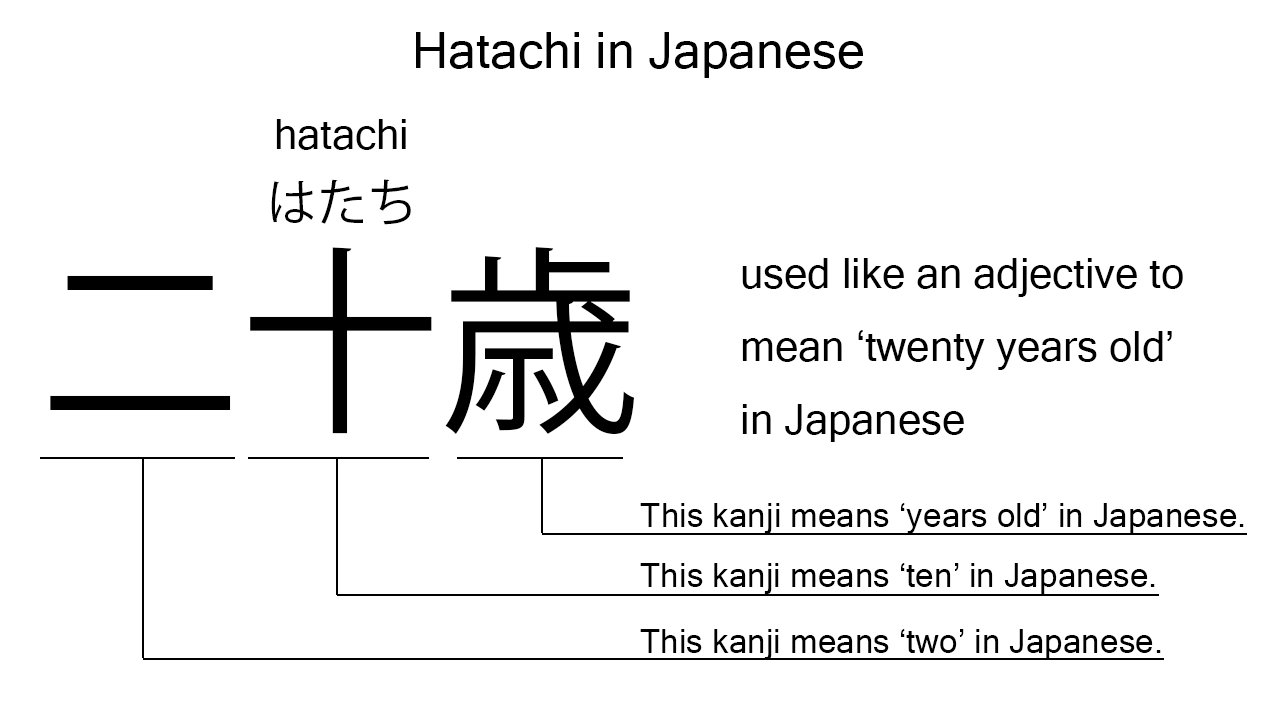What does “hatachi” mean in Japanese?
Native speakers say “hatachi” to mean ‘twenty years old’ in Japanese. Perhaps, some Japanese learners know this word as it is sometimes used in Japanese movies, songs, novels, manga, anime, and the like. In this blog post, however, I will explain this word in detail based on its kanji expression. And also, I will explain how to use it through example sentences. My explanations would help Japanese learners understand “hatachi” more clearly. Then, let’s get started!
Contents
Definition and meanings of “hatachi”
Let me start with the definition and meanings of “hatachi”.
- hatachi – 二十歳 (はたち) : a noun meaning ‘the age of twenty’, but quite often used like an adjective to mean ‘twenty years old’ in Japanese.
The definition and meanings are not that difficult, I think. To understand this noun more clearly, however, let me explain its kanji characters in detail, one by one.
What does “hatachi” literally mean in Japanese?
The kanji expression of “hatachi” consists of the following three kanji characters:
- 二 : a kanji character widely used as a numeral to mean ‘two’ in Japanese.
- 十 : a kanji character widely used as a numeral to mean ‘ten’ in Japanese.
- 歳 : a kanji character used to mean ‘years old’ in Japanese.
These three kanji characters tell us that the formed word literally means ‘twenty years old’ in Japanese. This literal interpretation is completely in line with the actual meanings.

When we meet new kanji expressions, we should check their kanji characters in detail to understand their meanings clearly and deeply. In many cases, kanji characters tell us a lot about the meanings of the expressions they form. Actually, here, we could get the better understanding of “hatachi” through the detailed kanji check above.
So far, I’ve explained the definition and meanings of “hatachi” together with its kanji characters. Then, let me explain how to use it through the example sentences below.
Example #1: how to say “twenty years old” in Japanese
kanojo wa ima hatachi desu – 彼女は今二十歳です (かのじょはいまはたちです)
She is twenty years old now.
Below are the new words used in the example sentence.
- kanojo – 彼女 (かのじょ) : a pronoun meaning ‘she’ in Japanese.
- wa – は : a binding particle working as a case marker or topic marker. In the example, this works after “kanojo” to make the subject in the sentence.
- ima – 今 (いま) : an adverb meaning ‘now’ in Japanese. In the example, this works in the middle of the sentence to mean ‘now’ in Japanese.
- desu – です : an auxiliary verb used after a noun or adjective to make it polite. Probably, this is well known as a part of Japanese desu form. In the example, this is used after “hatachi” to make it sound polite.
This is a typical usage of “hatachi”. In this example, it works as the complement in the sentence.
Example #2: another usage of “hatachi”
watashi tachi wa kotochi hatachi ni naru – 私達は今年二十歳になる (わたしたちはことしはたちになる)
We are turning twenty this year.
Below are the new words used in the example sentence.
- watashi – 私 (わたし) : a pronoun meaning ‘I’ in Japanese.
- tachi – 達 (たち) : a suffix used after a noun or pronoun to make its plural form. In the example, this is used after “watashi” to make its plural form, “watashi tachi”, which means ‘we’ in Japanese.
- kotoshi – 今年 (ことし) : a noun meaning ‘this year’ in Japanese. This can also work as an adverb almost anywhere in a sentence. In the example, this works as an adverb in the middle of the sentence to mean ‘this year’ in Japanese.
- ni – に : a case particle used to say what someone or something becomes after a change or action. In the example, this is used after “hatachi” to say what the speakers will become.
- naru – なる : a verb meaning ‘to become’, ‘to turn’, or just ‘to be’ in Japanese.
This is another typical usage of “hatachi”. In this example, it works as a part of the commonly-used phrase, “hatachi ni naru”, which means ‘to turn twenty’ in Japanese. When we want to mean ‘twenty years old’ or just ‘twenty’ in Japanese, anyway, this word is a very good option.
Summary
In this blog post, I’ve explained the definition and meanings of “hatachi” in detail based on its kanji expression. And also, I’ve explained how to use it through the example sentences. Let me summarize them as follows.
- hatachi – 二十歳 (はたち) : a noun meaning ‘the age of twenty’, but quite often used like an adjective to mean ‘twenty years old’ in Japanese. These three kanji characters literally mean ‘twenty years old’ in Japanese. This literal interpretation is completely in line with the actual meanings.
Hope my explanations are understandable and helpful for Japanese learners.